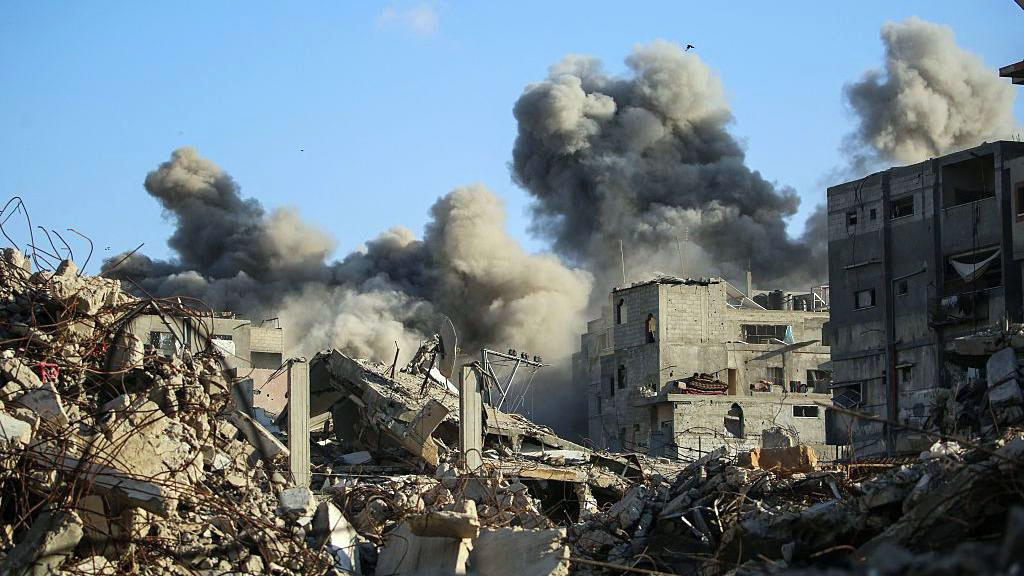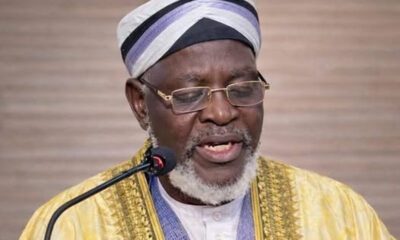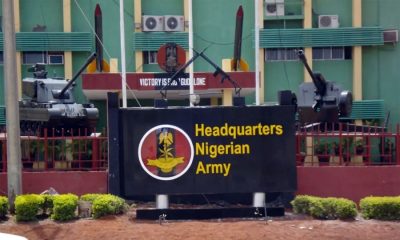International
As war enters bloody new phase, Ukraine again calls for more weapons

Russian forces bombarded several towns in eastern Ukraine on Sunday, destroying an airport and damaging several civilian targets, as the war careens toward a pivotal new phase. The shift of the war and fears of full-scale military confrontation on open terrain prompted Ukrainian officials to again call for Western alliances to step up weapons supply efforts to strengthen Ukraine’s position on the battlefield.
Ukraine is preparing for a “massive attack in the east,” its ambassador to the United States, Oksana Markarova, warned Sunday on CBS’s “Face the Nation.” Of the Russian forces, she said: “There are so many of them and they still have so much equipment. And it looks like they’re going to use all of it. So we are preparing for everything.”
Military analysts have been predicting the movement of the war toward the eastern border that Ukraine shares with Russia in an area known as Donbas. The energy-rich region includes territory where pro-Russian forces have been battling the Kyiv government since 2014.
Ukraine’s foreign minister, Dmytro Kuleba, cautioned that although leaders have been trumpeting success in driving Russian forces out of Kyiv, “Another battle is coming, the battle for Donbas,” he said Sunday on NBC’s “Meet the Press.”
The expected Russian offensive could resemble World War II, Kuleba recently told NATO, with large military maneuvers involving thousands of tanks, armored vehicles, artillery and aircraft. With the atrocities mounting in Ukraine, calls have grown to provide the country with offensive weapons that would allow forces to strike inside Russia. Several foreign allies, including the United Kingdom, have pledged new weapons shipments in recent days to help Ukraine in what is expected to be a tougher battle ahead.
READ ALSO:
- Gbajabiamila launches App for tracking legislators’ performances
- Osinbajo to APC governors: I’m running for president
- Lawmaker, others injured as thugs attack PDP meeting in Enugu
Ukrainian President Volodymyr Zelensky on CBS’s “60 Minutes” again called on Western countries to step up in providing arms. “They have to supply weapons to Ukraine as if they were defending themselves and their own people,” he said in an interview recorded Wednesday and broadcast Sunday. “If they don’t speed up, it will be very hard for us to hold on against this pressure.”
Zelensky urged even tougher sanctions against Russia and warned that Western nations shouldn’t be lulled into complacency thinking that they had staved off World War III by not intervening further.
“I think that today no one in this world can predict what Russia will do. If they invade further into our territory, they will definitely move closer and closer to Europe,” he said. “They will only become stronger and less predictable.”
Zelensky’s message has been relentless since the start of the Russian invasion, when he reportedly said “I need ammunition, not a ride.” Foreign Minister Dmytro Kuleba told NATO leaders in Brussels last week that Zelensky had a threefold agenda: “weapons, weapons and weapons.”
The United States has been cautious in its approach to providing armaments directly. The country’s focus “is on helping the Ukrainians defend their territory in Ukraine and take territory back,” Jake Sullivan, President Biden’s national security adviser, said on CBS’s “Face the Nation.”
“The United States is surging resources, weapons, military equipment, but also diplomatic resources to support the Ukrainians,” he said. He also discounted the notion that the United States hadn’t stepped up, saying the country has mobilized resources at “unprecedented scope, scale and speed.”
He noted that some of the steps include sourcing weapons systems that Ukrainian forces are already familiar with, such as the Soviet-era S-300 air defense system provided by Slovakia, to which the United States contributed a key component. The United States is also exploring systems that would require some training for the Ukrainian forces, Sullivan added.
Senate Minority Leader Mitch McConnell (R-Ky.) said Sunday that the United States needs to be more aggressive in aiding Ukraine. “I think the administration has been better, but they’ve had to be pushed every step of the way to be more aggressive, sooner,” McConnell told Fox News.
Backup can’t come soon enough as an eight-mile-long convoy of Russian military vehicles was making its way east, according to satellite images captured Friday and made available by Maxar Technologies, a U.S. space technology firm.
READ ALSO:
- I advised late Osinachi to leave her violent husband — Producer
- Conflicting Reports Over Viral Video Of Soldiers Evacuating ‘Bandits’ In Kaduna
- Late Osinachi’s Husband Arrested As Nigerians Rise Against Domestic Violence
As Russia shifts its military focus, officials in the eastern province of Luhansk urged people to evacuate immediately, saying the region could face a “very ugly and very bloody” fight. Sunday’s attacks damaged a school and hit two residential buildings, according to Luhansk’s governor, Serhiy Haidai, but no deaths were reported.
Already, more than 4.5 million Ukrainians have fled the country since the Russian invasion on Feb. 24, according to data from the United Nations. That figure is expected to grow as the fighting wears on.
Ukrainians continued to flee eastern Ukraine through humanitarian corridors, though authorities said they were stymied by Russian troops violating cease-fires and holding up buses at checkpoints.
About 2,800 people evacuated conflict areas via humanitarian corridors on Sunday, Ukrainian Deputy Prime Minister Iryna Vereshchuk said — far fewer than the more than 6,600 who fled conflict zones on Friday.
Amid a backdrop of mounting violence in Ukraine and economic devastation in Russia, President Vladimir Putin is expected to meet Austrian Chancellor Karl Nehammer on Monday, marking the first time since the invasion that Putin will have met face to face with a European leader. Nehammer visited Ukraine on Saturday and met with Zelensky.
Biden is scheduled to meet virtually with Indian Prime Minister Narendra Modi on Monday to push the country to abandon its neutral stance on the war. India has continued to buy Russian energy supplies, even as many countries around the globe have cut ties to punish Russia for its actions.
Biden and Modi will discuss the consequences of Russia’s war against Ukraine and “mitigating its destabilizing impact on global food supply and commodity markets,” White House press secretary Jen Psaki said Sunday in a statement.
Russian forces have now completely withdrawn from the areas around Kyiv and Chernihiv in the north, where their attempt to launch a sweep into the capital was thwarted by fierce Ukrainian resistance, U.S. officials said. Those troops are being refitted and resupplied, apparently for redeployment to the east, the Pentagon said.
In recent days, Ukrainian military officials said, the Russians have begun pushing south, with the eventual aim of seizing the city where a shelling attack on a train station occurred Friday. At least 57 people have died because of the attack and 109 were injured, according to the city’s governor.
Rep. Liz Cheney (R-Wyo.) said Sunday during an interview with CNN that the train station attack was “clearly genocide,” arguing that European countries that continue to purchase Russian energy supplies are “funding that genocidal campaign.”
Ukrainian officials and the state railway company announced new evacuation routes Sunday for civilians in eastern Ukraine. Deputy Prime Minister Iryna Vereshchuk said that “all the routes for the humanitarian corridors in the Luhansk region will work as long as there is a cease-fire by the occupying Russian troops.”
The refocus to the east, away from the largest cities, could be a challenge for Ukraine’s beleaguered forces and an advantage for Russian troops, Gen. Mark A. Milley, chairman of the Joint Chiefs of Staff, said last week, noting that Russians are more skilled at fighting in rural terrain.
Unlike near Kyiv, where Ukrainian forces were able to hide in forests, the expansive, open spaces of the east will make it harder for the Ukrainians to run guerrilla operations. For their part, Russian forces will be able to muster large mechanized formations of tanks and armored vehicles. Both sides appear positioned to dig in for a long and bloody battle focused in the east that U.S. officials have warned could last months or more.
Accounts of torture, beheadings and bodies used as booby traps for land mines near Ukraine’s capital Kyiv, as well as haunting images of mass graves and bound corpses, have increased the urgency of calls for help.
Ursula von der Leyen, the president of the European Commission who visited Bucha, Ukraine, last week, said on CNN’s “State of the Union” that “a lot has been done, but more has to be done.”
It will take at least two weeks for the bodies of those killed in the recent attacks near Kyiv to be recovered from the rubble, Ukrainian Interior Minister Denys Monastyrsky said in a television interview. After 24 hours of sifting through debris in Bucha, workers uncovered more than 6,500 explosive devices in doorways, washing machines, cars and under helmets, Monastyrsky said.
Ukraine has opened 5,600 war-crimes cases involving about 500 Russian leaders, including Putin, since Russia’s invasion, prosecutor general Iryna Venediktova said Sunday. But the country will face an uphill battle getting Russian officials into court.
The strike on Friday at a railway station in the east was a Russian missile attack that came as evacuees were waiting to escape an expected onslaught in the region, Venediktova said. A missile fragment found near the train station was inscribed with the words “for the children,” in Russian.
“These people just wanted to save their lives, they wanted to be evacuated,” Venediktova said, adding that the country has “evidence” it was a Russian strike.
The exodus from Ukraine has caused an outpouring of global support, with donors pledging 9.1 billion euros ($10 billion) for refugees at an event Saturday convened by Canada and the European Commission.
Pope Francis called for an “Easter truce” and “peace” in Ukraine during a Palm Sunday Mass in St. Peter’s Square at the Vatican.
“Put the weapons down,” he said, according to Reuters, as tens of thousands of people listened to his address. “Let an Easter truce start. But not to rearm and resume combat, but a truce to reach peace through real negotiations.”
Francis, who has repeatedly denounced Russia’s invasion but has not directly referenced Russia or Putin, said the “folly of war” leads people to commit “senseless acts of cruelty,” the Associated Press reported.
In Russia, those who speak out against the war are under increasing threat. At least four teachers have been turned in by students or parents for antiwar speech, in some of the starkest examples of the government’s quest to identify and punish individuals who criticize the invasion.
It’s a campaign with dark Soviet echoes, inspired last month by Putin, who praised Russians for their ability to identify “scum and traitors” and “spit them out like a fly.”
Russian students are turning in teachers who don’t back the war
After weeks of denial, Russian officials have acknowledged recently the scores of military casualties suffered by their forces. Kremlin spokesman Dmitry Peskov said the “significant losses of troops” were a “huge tragedy,” an unprecedented admission from a Russian government that has largely insisted the operation in Ukraine is going according to plan.
Now, as it seeks to rebuild its depleted forces for the next phase of battle, Russia is turning to retired soldiers, according to an intelligence briefing Sunday from the United Kingdom’s ministry of defense.
“The Russian armed forces seek to bolster troop numbers with personnel discharged from military service since 2012,” the ministry said. “Efforts to generate more fighting power also include trying to recruit from the unrecognised Transnistria region of Moldova.”
International
Israeli Airstrikes Kill 12 in Gaza as Violence Persists Despite Ceasefire

Israeli Airstrikes Kill 12 in Gaza as Violence Persists Despite Ceasefire
At least 12 Palestinians have been killed in Israeli airstrikes across the Gaza Strip, the territory’s civil defence agency reported on Sunday, marking one of the deadliest days since a fragile ceasefire was implemented. The strikes hit multiple areas, including Jabalia refugee camp in northern Gaza and the southern city of Khan Younis, leaving several others injured.
The Gaza Civil Defence, responsible for rescue and emergency operations under Hamas, said one airstrike struck a tent sheltering displaced civilians in Jabalia, killing at least five people and wounding others. Another strike in Khan Younis also claimed five lives, while additional shelling in Beit Lahia and western Gaza City caused further casualties. Local authorities said most victims were civilians, including families displaced by previous attacks.
READ ALSO:
- FBI Probe Continues as Ex‑Church Minister Who Confessed to Child Abuse Remains Free
- Presidency Dismisses El-Rufai’s Thallium Claim as Diversion From N432bn Probe
- Ghana Moves to Extradite Russian Man Over Secret Sex Video Scandal
The Israel Defence Forces (IDF) said its operations targeted armed militants and underground infrastructure allegedly used to launch attacks, describing the strikes as a response to ceasefire violations. Palestinian authorities condemned the strikes as a massacre and a breach of the truce, while international observers expressed concern over the continuing civilian casualties.
Since the U.S.-brokered ceasefire in October 2023, tensions in Gaza have remained high, with sporadic clashes and violations on both sides. Gaza health authorities report that over 600 Palestinians have been killed and more than 1,600 injured by Israeli strikes since the truce took effect. Humanitarian organisations warn that repeated airstrikes have devastated infrastructure, leaving displaced families vulnerable and worsening living conditions.
International observers note that the ongoing violence threatens reconstruction efforts and regional stability. With limited access for media and aid agencies, verifying casualty figures remains difficult, though reports consistently highlight the severe impact on civilians and displaced families.
The Gaza civil defence called on residents to stay vigilant, avoid military targets, and seek safety as authorities continue to respond to emergency situations across the territory. The situation underscores the fragility of the ceasefire and the urgent need for renewed diplomatic efforts to prevent further civilian casualties.
Israeli Airstrikes Kill 12 in Gaza as Violence Persists Despite Ceasefire
International
FBI Probe Continues as Ex‑Church Minister Who Confessed to Child Abuse Remains Free

FBI Probe Continues as Ex‑Church Minister Who Confessed to Child Abuse Remains Free
An ex‑minister of a secretive Christian group who publicly admitted to child sexual abuse during a BBC interview remains free more than two years later, despite ongoing investigations by the Federal Bureau of Investigation (FBI) and renewed allegations from other victims. The man, Robert Corfield, once served as a minister in a shadowy church commonly known as The Truth or the Two by Twos — a global network of itinerant ministers with no official headquarters or widely recognised name. In early 2024, Corfield told the BBC that he had sexually abused a boy named Michael Havet for six years starting in the 1980s when Havet was 12 years old, in Saskatchewan, Canada.
Corfield’s admission was part of a larger wave of revelations about abuse in the Two by Twos community. His name was among more than 1,100 reported to a hotline set up to document cases of sexual abuse within the church. About a month after the BBC’s initial investigation, the FBI launched a probe into allegations of child sexual abuse within the group. Although Corfield spoke to FBI agents in late 2024 or early 2025, saying he “responded with the truth,” he has not been contacted by authorities since that visit and remains at liberty in the U.S. state of Montana. When asked if he fears arrest, Corfield acknowledged that “there is that possibility.”
READ ALSO:
- Presidency Dismisses El-Rufai’s Thallium Claim as Diversion From N432bn Probe
- Ghana Moves to Extradite Russian Man Over Secret Sex Video Scandal
- Residents Flee as Gunmen Launch Fresh Attack on Kwara Community
Authorities, including the Royal Canadian Mounted Police (RCMP), have also been involved. The RCMP confirmed it investigated historic sexual assaults that occurred in the 1980s and sent files to Crown prosecutors for assessment, while the Saskatchewan Ministry of Justice noted it does not comment on cases currently under investigation. A separate alleged victim, identified only as Edward, came forward in 2025 claiming he was sexually assaulted by Corfield in 1974 at age 11, well before Corfield’s abuse of Michael. Edward also described alleged grooming behaviours, adding to concerns about Corfield’s past conduct.
Corfield’s case is part of broader allegations of abuse in the Two by Twos community, which some survivors and investigators describe as insular and resistant to external scrutiny. Advocacy groups have reported hundreds of alleged historical abusers connected to the sect globally. In the United States, a former elder of the Two by Twos was sentenced to 120 years in prison for possessing child sexual abuse material, highlighting that criminal accountability is possible when prosecutions occur. Survivors and advocates have criticised the church leadership’s historical handling of abuse allegations, alleging that serious complaints were ignored or covered up. Former members say the group’s structure — with ministers often hosted in private homes and an emphasis on internal solutions — made it easier for abuse to go unreported for decades.
While investigators continue their work, Corfield’s freedom has drawn sharp criticism from survivors like Michael, who has expressed confusion and frustration at the slow pace of legal action. Advocates have urged authorities in both the United States and Canada to urgently pursue all leads, not only against individual perpetrators but also over potential institutional failures within the church. Support networks for survivors have also grown online and through advocacy organisations, offering counselling and community resources for victims of the alleged abuse. Despite these efforts, many survivors say justice remains elusive more than two years after the minister’s public confession.
FBI Probe Continues as Ex‑Church Minister Who Confessed to Child Abuse Remains Free
International
Trump Halts Minnesota Immigration Crackdown After Fatal Shootings, Protests

Trump Halts Minnesota Immigration Crackdown After Fatal Shootings, Protests
The Trump administration has officially halted Operation Metro Surge, a controversial immigration enforcement operation in Minnesota, following widespread protests, political backlash, and the deaths of two U.S. citizens. The decision was announced by Tom Homan, the U.S. “border czar,” who confirmed that President Donald Trump approved ending the monthslong crackdown.
Operation Metro Surge, launched in December 2025, focused on the Minneapolis–St. Paul metropolitan area, deploying nearly 3,000 federal immigration officers at its peak. The operation aimed to detain undocumented immigrants, which the Department of Homeland Security (DHS) described as targeting “criminal illegal aliens.” However, reports indicate that many detainees had no criminal records, including children and U.S. citizens, raising concerns about the operation’s scope and fairness.
- Army University Professor Dies in Boko Haram Captivity After Nearly One Year
- MURIC Calls Proposed US Sanctions on Nigerian Muslims ‘Lopsided’
- Supreme Court Affirms Muslim Students’ Right to Worship at Rivers State University
The crackdown drew intense public opposition after anti-ICE protesters Renée Good and Alex Pretti were fatally shot during separate incidents in Minneapolis. The shootings intensified calls for accountability and prompted local and national criticism of federal enforcement tactics.
In a statement, Homan said, “I have proposed and President Trump has concurred that this surge operation conclude.” He noted that a drawdown of federal personnel had already begun, with a smaller contingent remaining temporarily to transition operations and coordinate with local authorities.
During the operation, DHS reported over 4,000 arrests, though critics highlighted the disproportionate impact on communities and families, emphasizing the humanitarian and civil liberties concerns arising from the surge.
Minnesota officials, including Governor Tim Walz and Minneapolis Mayor Jacob Frey, welcomed the decision, calling the operation an overreach that harmed communities and strained trust between law enforcement and residents. Civil rights groups also praised the halt but urged comprehensive immigration reforms to prevent future abuses.
The end of Operation Metro Surge marks a significant development in the national debate over immigration enforcement, sanctuary policies, and federal authority, highlighting the challenge of balancing border security with human rights and community safety.
Trump Halts Minnesota Immigration Crackdown After Fatal Shootings, Protests
-

 Education23 hours ago
Education23 hours agoCheck Your Name: UNILORIN Releases Updated NELFUND Refund List for 2024/2025 Students
-

 News15 hours ago
News15 hours agoOsogbo Sons and Daughters Mark 5th Anniversary with Awards, Political Undertones
-

 metro2 days ago
metro2 days agoWoman Arrested Over Murder of Nigerian E-Hailing Driver in South Africa
-

 metro2 days ago
metro2 days agoBoko Haram Terrorists Release Video of 176 Abducted Kwara Residents
-

 News1 day ago
News1 day agoAfenifere Calls for Immediate Take-Off of State Police as Terror Threats Rise in Yorubaland
-

 metro3 days ago
metro3 days agoCourt Orders DIA to Produce Cleric Accused of Coup Plot by February 18
-

 metro1 day ago
metro1 day agoUS Military Boosts Support for Nigeria’s Fight Against Insurgency With Ammunition, Troop
-

 metro1 day ago
metro1 day agoArgungu Festival 2026 Highlights Peace, Stability, Economic Growth — Tinubu















